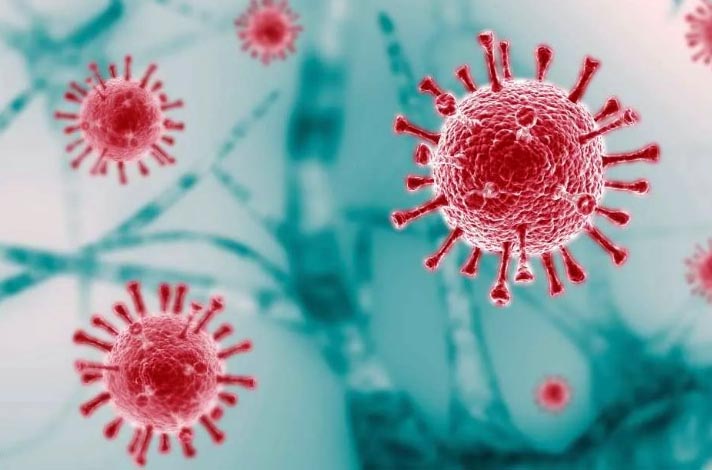Nikhil Prasad Fact checked by:Thailand Medical News Team Oct 12, 2025 4 months, 2 weeks, 1 day, 6 hours, 6 minutes ago
Medical News: COVID-19 Driven by a Hidden Battle Between Body Enzymes and Their Inhibitors
A major new review by Italian researchers has shed light on how COVID-19 is not just a respiratory infection but a complex disease triggered by an imbalance between enzymes known as proteases and their natural inhibitors, called antiproteases. This imbalance creates a chain reaction in the body that drives inflammation, blood clotting, and damage to multiple organs. The study was conducted by scientists from AFO Medica Santa Maria delle Grazie Hospital in Pozzuoli, Parma University Hospital, University of Messina, Vanvitelli University of Naples, Padua University Hospital, Humanitas Hospital Milano, and AORN Ospedale dei Colli in Naples.
 COVID-19 Linked to Dangerous Enzyme Imbalance Driving Organ Damage
COVID-19 Linked to Dangerous Enzyme Imbalance Driving Organ Damage
At the center of their findings is the idea that when SARS-CoV-2 enters the body, it hijacks proteases—enzymes that normally help break down proteins—to invade human cells. But this viral manipulation triggers an uncontrollable storm, causing these proteases to overactivate and outnumber antiproteases. As a result, the protective systems that usually keep inflammation and blood clotting in check start to fail, leading to widespread vascular injury, microclots, and immune overactivation. According to this
Medical News report, this hidden biochemical chaos may explain why COVID-19 can lead to severe lung damage, heart problems, and even long-term symptoms like fatigue and brain fog.
How Enzymes Become the Hidden Villains in COVID-19
The study explains that key proteases such as TMPRSS2, furin, and neutrophil elastase assist the virus in entering cells but also drive inflammation and tissue destruction. This overactivity disrupts the delicate balance within the immune and blood vessel systems, particularly affecting the lungs and heart. When coupled with a cytokine storm—an extreme release of inflammatory chemicals—the result is tissue breakdown and clot formation in the lungs, heart, and other organs.
The researchers also found that this enzyme imbalance triggers a cascade involving the complement system, the renin-angiotensin system (RAS), and the kallikrein-kinin system (KKS)—all of which contribute to inflammation and blood vessel leakage. When these pathways overlap, the result is endothelial injury and widespread clotting known as immunothrombosis, a key cause of severe COVID-19 and death.
The Failure of the Body’s Natural Defenses
Under normal conditions, antiproteases—such as antithrombin, alpha-1 antitrypsin, and thrombomodulin—counterbalance proteases to prevent excessive tissue damage. But in COVID-19, these antiproteases are either destroyed or suppressed. This leads to high levels of molecules like plasminogen activator inhibitor-1 (PAI-1) and lipoprotein(a), which block the body’s ability to dissolve blood clots. The consequence is a dangerous hypofibrinolytic state, where the body forms clots but cannot break them down effectively. This is why COVID-19 patients are at risk of venous thromboem
bolism and pulmonary embolism, even after recovery.
New Avenues for Treatment and Prevention
The Italian team proposes that restoring the protease–antiprotease balance could be a powerful therapeutic target. Drugs that block TMPRSS2 or kallikrein, along with natural antiprotease boosters like alpha-1 antitrypsin, might help control inflammation and prevent clotting. Heparin, already used widely during the pandemic, was shown to have beneficial antiprotease and anti-inflammatory effects.
The researchers believe that understanding this enzyme imbalance could also explain long COVID symptoms and help design personalized treatments. They urge future studies to explore protease inhibitors, complement blockers, and new biomarkers that measure protease activity in the blood as tools for early intervention.
Conclusion
This review offers a new way of looking at COVID-19—as a disease driven not only by a virus but also by a breakdown in the body’s natural enzyme regulation. By focusing on protease–antiprotease balance, scientists may finally unravel why COVID-19 can harm so many organs and persist long after infection. Targeting this imbalance could open the door to more effective therapies for both acute and long COVID cases, transforming how we manage future outbreaks.
The study findings were published in the peer-reviewed journal: Infection and Drug Resistance.
https://www.dovepress.com/covid-19-a-disease-driven-by-proteaseantiprotease-imbalance-a-specific-peer-reviewed-fulltext-article-IDR
For the latest COVID-19 news, keep on logging to Thailand
Medical News.
Read Also:
https://www.thailandmedical.news/news/polish-medical-researchers-warn-that-covid-19-is-triggering-thyroid-cancers
https://www.thailandmedical.news/news/cerebromicrovascular-health-and-long-covid
https://www.thailandmedical.news/news/sulodexide-effectively-mitigates-thromboinflammation-and-endothelial-damage-reducing-risks-associated-with-long-covid
